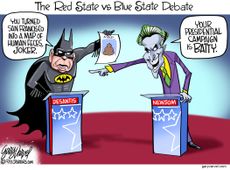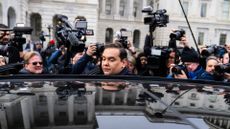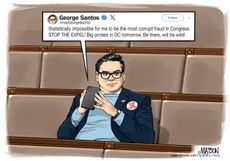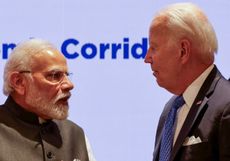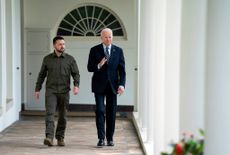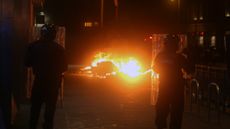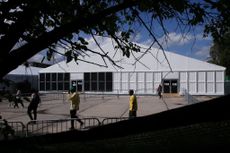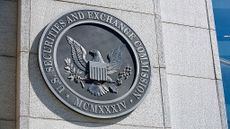Henry Kissinger dies aged 100: a complicated legacy?
Top US diplomat and Nobel Peace Prize winner remembered as both foreign policy genius and war criminal
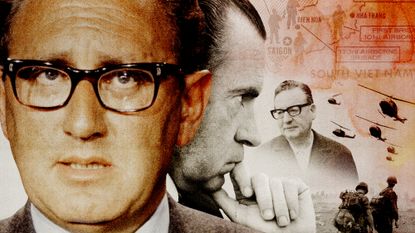
"Doctor Strangelove", "Nixon's Metternich", "Middle East Cyclone".
These nicknames "testified to the exceptional personality and immense power in world affairs" that was Henry Kissinger, the former US secretary of state and foreign policy giant, who has died at the age of 100, said Le Monde.
A "ruthless practitioner of the art of realpolitik" and a "cunning, erudite strategist", Kissinger had an "outsize impact on global events" as the top diplomat and national security adviser under both the Nixon and Ford administrations, said Politico's senior editor David Cohen.
Subscribe to The Week
Escape your echo chamber. Get the facts behind the news, plus analysis from multiple perspectives.

Sign up for The Week's Free Newsletters
From our morning news briefing to a weekly Good News Newsletter, get the best of The Week delivered directly to your inbox.
From our morning news briefing to a weekly Good News Newsletter, get the best of The Week delivered directly to your inbox.
Kissinger's controversial position on the Ukraine war, advocating a ceasefire with Russia, is an example of both his enduring relevance and the "emphasis on realism and de-escalation of tensions between great world powers" he often proposed, said The New York Post.
But his tenure was "defined by his contempt for human rights and efforts to protect US corporate interests at all costs", said The Guardian. His opponents cast him as a "war criminal", for his support of dictators in Chile, Indonesia and Pakistan, and for the unauthorised US bombing of Cambodia in the 1960s and 1970s that killed between 150,000 and 500,000 civilians, and arguably led to the bloody dictatorship and genocide of Pol Pot.
'Diplomatic efforts helped to reshape world'
Kissinger's life and legacy his career "testified to the mobility of American society, where a German-Jewish emigrant with no resources managed to reach the heights of power", said Philippe Bernard and Henri Pierre in Le Monde.
Although he was joint winner of "a premature Nobel Peace Prize for ending a war that kept going" in Vietnam, said Politico's Cohen, the scholar and military veteran shaped much of America's Cold War strategy and had a hand in US policies on Israel, Chile, China and the Soviet Union. His "transformative diplomatic efforts helped to reshape the world".
But more significant in the long term was Kissinger's role in helping to normalise relations with the communist government in Beijing. He was so much "at the heart of the United States' rapprochement with China" in the 1970s that Chinese officials are mourning his death, said The Washington Post. The "outpouring of praise and nostalgia for Kissinger was a distinct change in tone for China's state-run news outlets, noted in recent years for their antipathy toward American administrations". The state broadcaster labelled Kissinger an "old friend of the Chinese people".
Both his "triumphs" and his errors "stemmed from his embrace of a realist school of foreign policy", said The Washington Post editorial. However, "noting his errors is not to downplay Mr Kissinger’s significance, but to prove it."
'Foul deeds resulted in mayhem and death'
Nevertheless, the US failures in Vietnam "ultimately became synonymous with Kissinger", said US reporter Ariana Baio in The Independent.
His legacy includes "foul deeds that resulted in mayhem and death – thousands and thousands of deaths", said Mother Jones's Washington bureau chief David Corn.
Kissinger's obituaries will be "filled with hosannas from the foreign policy establishment that hailed him as the wisest of wise men", but unfortunately, those who were "slaughtered in part due to his global gamesmanship are not able to comment".
Indeed, it is an "insult to history" that Kissinger was not equally known and regarded for his many acts of treachery – "secret bombings, coup-plotting, supporting military juntas" – as he was for his foreign policy achievements.
Shortly after Nixon moved into the White House and inherited the Vietnam War, he, Kissinger and others "cooked up a plan to secretly bomb Cambodia" to ramp up pressure on north Vietnam. The US military dropped 540,000 tons of bombs – unauthorised by Congress – killing between 150,000 and 500,000 Cambodian civilians, and arguably leading to the brutal regime of Pol Pot.
In 1970, Nixon and Kissinger "plotted to covertly thwart the democratic election" of Chilean President Salvador Allende, triggering a military coup. General Augusto Pinochet seized power, implemented a dictatorship and "killed thousands of Chileans" – all the while "backed to the hilt" by Kissinger, continued Corn.
It is an "honourable admonition" not to speak ill of the dead. "But what of the truth? When a person dies, should he be remembered accurately? That question is acutely posed by the demise of Henry Kissinger."

Continue reading for free
We hope you're enjoying The Week's refreshingly open-minded journalism.
Subscribed to The Week? Register your account with the same email as your subscription.
Sign up to our 10 Things You Need to Know Today newsletter
A free daily digest of the biggest news stories of the day - and the best features from our website
Harriet Marsden is a writer for The Week, mostly covering UK and global news and politics. Before joining the site, she was a freelance journalist for seven years, specialising in social affairs, gender equality and culture. She worked for The Guardian, The Times and The Independent, and regularly contributed articles to The Sunday Times, The Telegraph, The New Statesman, Tortoise Media and Metro, as well as appearing on BBC Radio London, Times Radio and “Woman’s Hour”. She has a master’s in international journalism from City University, London, and was awarded the "journalist-at-large" fellowship by the Local Trust charity in 2021.
-
 Today's political cartoons - December 2, 2023
Today's political cartoons - December 2, 2023Cartoons Saturday's cartoons - governors go Gotham, A.I. goes to the office party, and more
By The Week US Published
-
 10 things you need to know today: December 2, 2023
10 things you need to know today: December 2, 2023Daily Briefing Death toll climbs in Gaza as airstrikes intensify, George Santos expelled from the House of Representatives, and more
By Justin Klawans, The Week US Published
-
 5 hilarious cartoons about the George Santos expulsion vote
5 hilarious cartoons about the George Santos expulsion voteCartoons Artists take on Santa versus Santos, his X account, and more
By The Week US Published
-
 Worklessness: a national 'scandal'
Worklessness: a national 'scandal'Talking Point One in five working-age adults in Birmingham, Glasgow and Liverpool are neither in work nor seeking work
By The Week UK Published
-
 Alleged Sikh assassination plot rocks US-India relations
Alleged Sikh assassination plot rocks US-India relationsTalking Point By accusing an Indian government official of orchestrating an assassination attempt on a US citizen in New York, the Justice Department risks a diplomatic crisis between two superpower
By Rafi Schwartz, The Week US Published
-
 'In Ukraine, sadly, promises are hard to keep'
'In Ukraine, sadly, promises are hard to keep'Instant Opinion Opinion, comment and editorials of the day
By Harold Maass, The Week US Published
-
 Dublin riots: a blow to Ireland’s reputation
Dublin riots: a blow to Ireland’s reputationTalking Point Unrest shines a spotlight on Ireland's experience of mass migration
By The Week UK Published
-
 'This migrant crisis is not unlike problems we've faced before'
'This migrant crisis is not unlike problems we've faced before'Instant Opinion Opinion, comment and editorials of the day
By Harold Maass, The Week US Published
-
 The Supreme Court could reign in the SEC — and federal agencies as a whole
The Supreme Court could reign in the SEC — and federal agencies as a wholeTalking Point The court is hearing arguments on the agency's ability to enforce financial penalties
By Justin Klawans, The Week US Published
-
 Is Nikki Haley's Koch network endorsement the shake-up the GOP primary has been waiting for?
Is Nikki Haley's Koch network endorsement the shake-up the GOP primary has been waiting for?Today's big question By throwing its weight behind the insurgent former UN ambassador, the conservative PAC hopes to tilt the scales against Trump
By Rafi Schwartz, The Week US Published
-
 'Carbon taxes are all pain with no gain'
'Carbon taxes are all pain with no gain'Instant Opinion Opinion, comment and editorials of the day
By Harold Maass, The Week US Published
